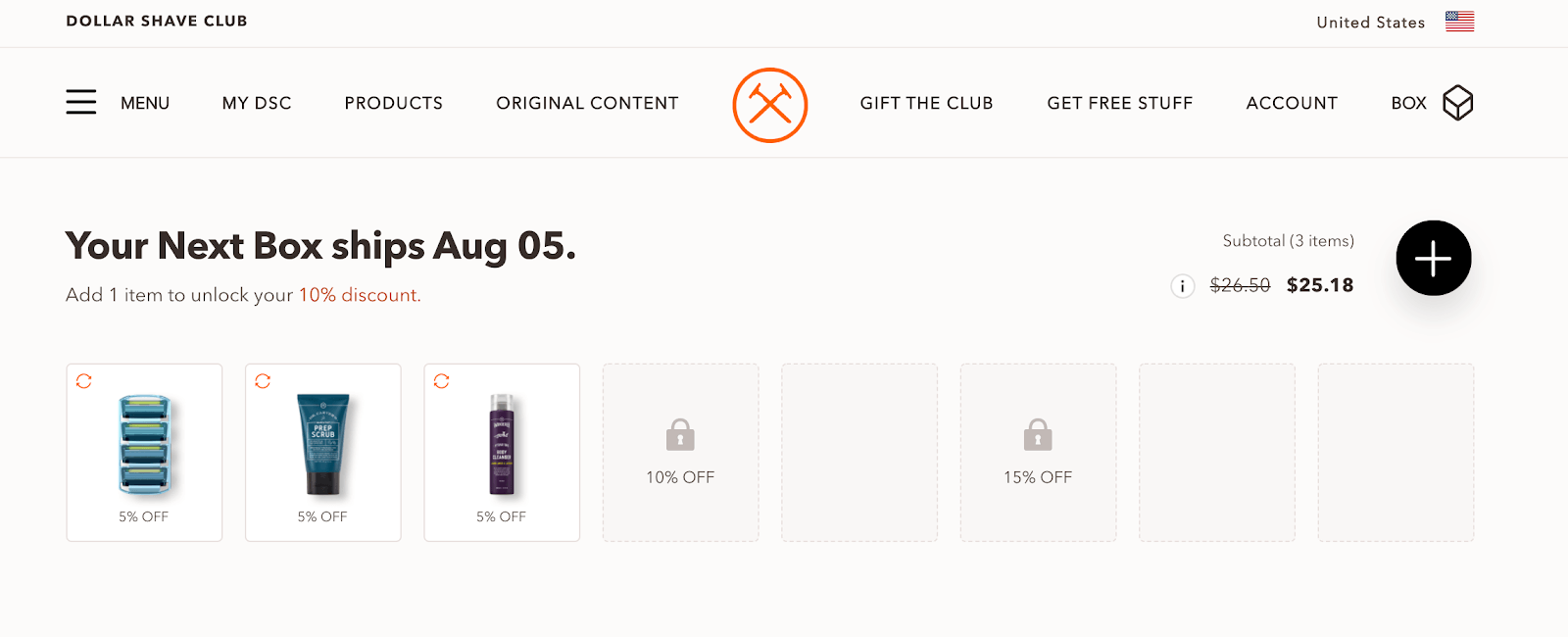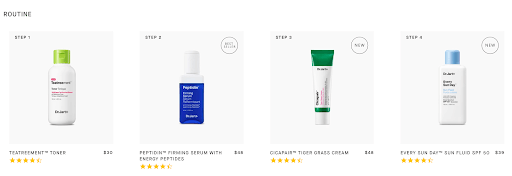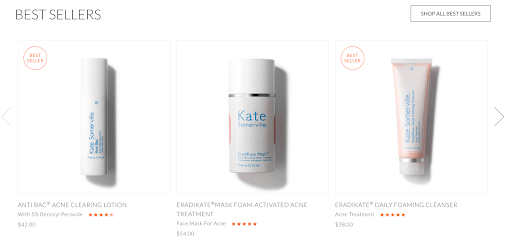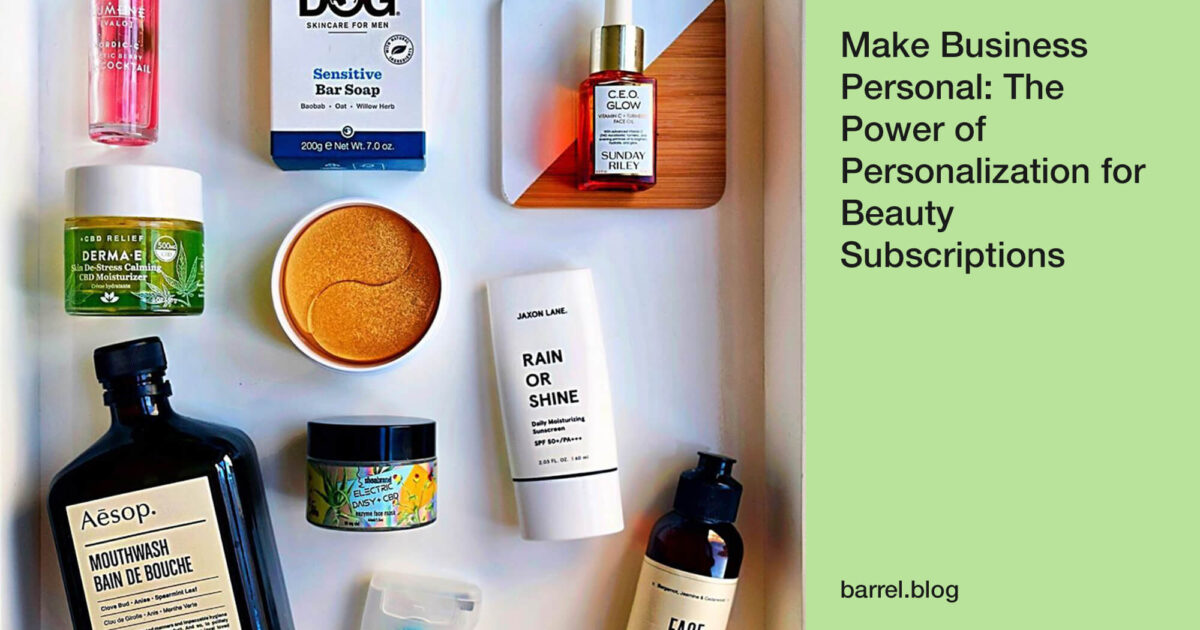The relationship a person has with a beauty brand is inherently personal.
Every person has a beauty routine that is unique to them. It is specific to their needs. Their struggles. How they look. And how they want to look.
The stakes are high for every product they buy, because our faces are constantly on display. Beauty consumers want to find products and brands they can trust to fulfill their needs.
Beauty products are also perfect for subscriptions because they’re consumable products, specific to an individual’s needs, that they’ll need over and over.
But people want more than just a good product and convenience from a subscription beauty brand.
Accenture Research found that 91% of consumers are more likely to shop with brands who recognize and remember their customers.

Consumers want to feel like their interactions with a brand are unique and valued. They want a brand they can trust, to build a relationship with to depend on.
This emphasizes the personal nature of beauty products and beauty subscriptions. The more a customer interacts with your brand and products, the more you can learn about them. Every month or quarter they decide to keep their subscription, you get a little more insight into their life and needs.
So while, as a beauty brand, it’s easy to think “it’s not personal, it’s business,” to your consumers, it is personal.
Making your customers feel unique, special, known and understood is critical.
The best way to do this is through a tactic called personalization.
What is Personalization?
Personalization is utilizing customer behavior to deliver an experience that feels truly unique and tailored to them.
Some personalization tactics have become commonplace over the last few years. If you have an abandoned cart email, you’re personalizing. If you put a first name in an email automatically, you’re personalizing.
But that’s the baseline. Let’s be real, no one is impressed by these small moments of personalization anymore.
That is table stakes now.
Why is Personalization Important?
Personalization is a way to deliver a better customer experience, which leads to higher order values and better retention. Personalization makes people feel known. It makes them feel like they matter. And it makes the buying process easier.
How?
You reduce the level of effort required to make a purchase by putting the right content in front of your customers. If you know that someone has shopped for products focused on oily skin, then showcasing products and bundles for that skin type will keep each site visit relevant and valuable.
They don’t have to browse through tons of unrelated products that are for completely different skin types.
Once they’re on your email list, you can send them content about oily skin to keep the emails valuable to them. This could include discussing how oily skin should affect their choice of sunscreens and routines, sharing educational content from your blog about oily skin, and making product recommendations designed for their skin type.
Improving the customer experience leads to increased customer retention. And customer retention is the key to scaling, especially for subscription-based brands.
As we mentioned earlier, people want to shop with brands that recognize them, remember them, and provide relevant information to them. That means that you are more likely to get repeat customers, and build that brand loyalty that all brands dream of when you add personalization to the buying process.
If you deliver a great experience, people stay in your subscription program longer. This means you make more and you spend less to get that revenue.
Let’s simplify that one more time, just to make sure this really sinks in.

Personalization leads to a better customer experience. Better customer experiences lead to better retention. Better retention leads to higher lifetime value (LTV). Higher LTV leads to profit.
How Do You Personalize the Beauty Subscription Experience?
The great thing about beauty products is that people are using them to address real problems. So when a person subscribes to you, you can figure out exactly what problem they are looking to solve.
Before They Subscribe
Product education is essential for getting people to understand why they should buy your product, how to use it properly, and how they will benefit as a result.
Personalization makes this process more one-to-one, and allows you to talk specifically to the results your customer might see.
Create a quiz to help new visitors find the right products, and follow up with emails that have educational content. Use personalization to feature relevant content when they go to the blog, or elsewhere on the homepage.
Make product recommendations dynamic. Continue to educate. Remind them why these are the right products for them.
If you’ve suggested products and they still haven’t bought, don’t give up. Show them alternatives. Do you have something else that can fit the bill? What else do people with the same problem buy?
Product & Subscription Control
The next step in personalizing the customer experience is to think about the process for them.
Let your subscribers customize their subscription to make sure they get the right products, in the right volume, at the right time for them.
A great example of this is Dollar Shave Club.
Within the subscription dashboard you can easily add and remove products, change your next shipment date, and adjust the frequency that the subscription gets sent.

Having options like this makes your customer feel in control. They aren’t locked in to anything. If they’re using a product less often, they can get it less frequently.
One of the biggest causes of cancelled subscriptions is that people get too much of a product and aren’t using it fast enough.
By giving the customer the power to make their subscription fit better with their needs, you’ve alleviated that concern.
Product Recommendations
Making personalized product recommendations comes down to identifying the problem they’re trying to solve. You can figure this out by looking at the results from the quiz they took, the products they’ve bought, or even just the categories of products they’ve browsed.
Once you know the problem, you can proactively offer complementary products that either will increase the efficacy of their current products or new products to address their primary concerns.
Do they use an exfoliant rub? Suggest a mask that would help with exfoliation, and also improve dry skin.
These recommendations can be as simple as an email (a great tool for personalization, especially when trying to do it on a budget) or as in-depth as a customized product carousel within their account page or homepage.
Almost all ecommerce stores have some sort of suggested product module on PDPs. Typically this is based on popularity, so best selling products get shown to everyone.
Sometimes companies go the next step and change this to say “customers also bought” or “complete the routine.” For example, Dr Jart+ clearly lays out the full routine a product is a part of and where it lies within that sequence.

The absolute win for including personalization in a product carousel would be something like, “recommended for you,” where it combines both products they’ve browsed and ones that will complement their current subscription.
Kate Sommerville does this well, using a tool called Nosto. New users are shown popular products as their recommendations. As users return (like any of your subscribers would), the product recommendations become based on previous browsing and purchase behavior.

Nosto is a powerful personalization tool because it extends beyond just the product recommendation carousels, and can be used to personalize messages in key visual elements like your hero section.
Appreciation
People like to be known and acknowledged.
Reinforce that you know your customer by using Shopify Flows (if you’re on Shopify Plus) or Klaviyo automations coupled with dynamic coupons to send them a special offer.
This can be persuasive if used at key inflection points in the customer lifecycle, but can also just be a nice touch at (seemingly) random points.
Maybe you’ve seen that when people pause a subscription for 2 months in a row that they are likely to unsubscribe the following month. You can set up an automation to push them a discount code on a new, exciting product.
We emphasize “seemingly” random because you’re building and planning for it, but to the recipient it is random and unexpected. And aren’t those unexpected gifts and surprises the ones that mean the absolute most to people?
It’s Business AND It’s Personal
The important thing to recognize is that personalization is an untapped tool that will improve the customer experience, and will increase both average order value and retention within your beauty subscription.
The first step is to think, “what would be an amazing experience for my customers?”
From there, we can build a methodology that works for your budget, your brand, and your customers.
We partner with brands to improve the overall e-commerce experience for customers. Learn more about Barrel and the work we do for growing brands.
Featured image courtesy of Josh Blaylock. Follow him on Instagram at @mancrediblebeauty.
